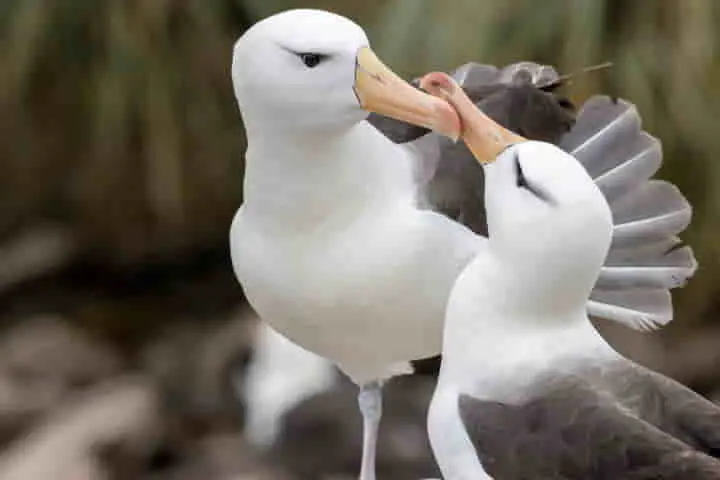

A recent study has found that change in environment and climate could affect the relationship between albatross pair (Pic. Courtesy Twitter/@FI_Conservation)
<p>
<strong>Whoever could have imagined that warming up of oceans could lead to split among albatross pairs &ndash; considered as the most durable and faithful ones among creatures. But that is happening according to an article in sciencenews.org.</strong></p>
<p>
While 90 per cent of birds are monogamous and among them albatross remain most faithful, very rarely separating and breeding with the same partner year on year. Now proving contrary to this is a new study that suggests that as waters of the oceans are getting warmer than average, a number of their pairs are splitting up.</p>
<p>
The study published on November 24 in Proceedings of the Royal Society B stated that during the period when water was warmer, the separation between the albatross rose up to 8 per cent in Falkland Islands, which in normal times is less than four per cent on average.</p>
<p>
<iframe allow="accelerometer; autoplay; clipboard-write; encrypted-media; gyroscope; picture-in-picture" allowfullscreen="" frameborder="0" height="315" src="https://www.youtube.com/embed/qh8JZRgDb44" title="YouTube video player" width="560"></iframe></p>
<p>
This finding turned out to be the first of its type to highlight that apart from failure to breed, environment too plays a role in separation of birds. What is noteworthy is that even females who had bred well had broken up with their partners.</p>
<p>
The study&rsquo;s outcome brings to the fore that as human activity results in changes in climate, the chances of split among albatrosses and may be other animals who are monogamous may be a consequence that has been overlooked, according to the researchers.</p>
<p>
The birds under study have the knack of living in the oceans for years in search of food and they come back to dry land only with the aim of breeding. Thus pairs which have stayed together bring in the advantage of familiarity and better coordination that go a long way in raising young ones.</p>
<p>
According to Francesco Ventura, a conservation biologist at Portugal&rsquo;s University of Lisbon, this steadiness is vital considering the marine environment&rsquo;s dynamic nature.</p>
<p>
<strong>Also read: <a href="https://www.indianarrative.com/science-news/fight-between-two-bald-eagles-in-a-minnesota-street-hides-a-fascinating-back-story-129994.html">Fight between two bald eagles in a Minnesota street hides a fascinating back story</a></strong></p>
<p>
In case breeding is not successful, then many of the birds, generally females, tend to ditch their partners in order to try their luck with some else. With more difficult conditions, breeding is likely to fail causing an increase in splits. What Ventura wants to study is if the environment has an impact which is directly causing divorce among the birds irrespective of the quality of breeding.</p>
<p>
Along with his colleagues Ventura studied the data gathered from a huge colony of black-browed albatrosses (Thalassarche melanophris) for the period 2004 to 2019 living on Falkland Islands&rsquo; New Island. About 2,900 breeding attempts were recorded among 424 females along with break ups among the birds. Taking in account earlier breeding success in individual pairs, the scientists tried to work if changes in environmental conditions had caused a visible impact.</p>
<p>
The prime reason for separation was failure in breeding. With each female laying a single egg, birds whose eggs did not hatch or whose chicks did not live, were five times more likely to part ways from their partner as compared to those which succeeded.</p>
<p>
The divorce rate in some years was lower than one per cent. This rate went up reaching 7.7 per cent in 2017 with the water becoming the warmest. Calculations by the researchers suggested that probability of separation was correlated with the increase in temperature.</p>
<p>
<strong>Also read: <a href="https://www.indianarrative.com/science-news/birds-lose-weight-increase-wing-span-in-response-to-climate-change-128460.html">Birds lose weight, increase wing span in response to climate change</a></strong></p>
<p>
Surprisingly it was also found that among the successful breeding partners, females are most expected to be influenced by change in environment than males and/or females who did not breed or failed. With the drop in temperatures in 2018 and 2019, the rate of separation also lowered.</p>
<p>
The warming up of water causes availability of lesser nutrients thereby forcing the birds to stay longer at sea, not only delaying their arrival at the colony but also probably making them unappealing after the strain. When the pair members turn up at different times, breakups can take place.</p>
<p>
Conditions which are adverse could lead to stress-related hormones affecting the choice of the mate. The stress also could be attributed to the partner instead of the environment making the pair separate despite successful hatching.</p>
<p>
Evolutionary ecologist of the Netherlands Institute of Ecology located in Wageningen, Antica Culina said misreading between reality and cues could render separation a less-effective behaviour. Separation for wrong factors could result in lower success rate of breeding and thereby reduction in population. Culina was not involved in the study.</p>
<p>
The scientists feel such patterns can be deciphered among other monogamous animals, including the mammals. Stressing on the importance of the study, Ventura remarked: <a href="https://www.sciencenews.org/article/albatross-bird-divorce-ocean-warm-breeding-climate?utm_source=email&amp;utm_medium=email&amp;utm_campaign=latest-newsletter-v2&amp;utm_source=Latest_Headlines&amp;utm_medium=email&amp;utm_campaign=Latest_Headlines">&ldquo;If you imagine a population</a> with a very low number of breeding pairs &hellip; this might have much more serious repercussions.&rdquo;</p>
Taiwan's military is prioritising combat readiness as a key aspect of deterrence due to escalating…
Calling for an increase in the speed of development, Prime Minister Narendra Modi said on…
The Scottish Government has reaffirmed its commitment to supporting religious freedom and human rights for…
Tara Chand Baloch, the President of the Baloch American Congress and a former Cabinet minister…
In a groundbreaking study, researchers from McGill University have identified nine biological markers in the…
India, in a firm and unequivocal statement at the United Nations Security Council (UNSC), accused…